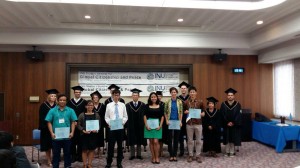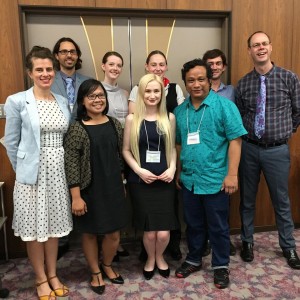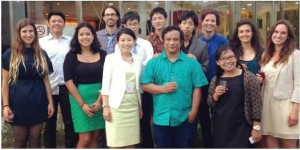Kon’nichiwa (Hello)!
I have come back from Hiroshima, Japan, after attending the INU Master’s Summer School on Global Citizenship and Peace nearly a week ago. I am more than happy to share my experience. It was amazing! I recommend my fellow students of Flinders University to apply for this program as it is exceptionally supportive to increase academic knowledge and understanding on some of the contemporary academic discourses on global citizenship and peace. First of all, the program gives opportunity to participate in the series of discussions on contemporary academic and theoretical discourses in an interactive way, in which the lectures are delivered by outstanding academic intellectuals. Also, the participants are given opportunity to write and present their essays on particular themes. Then the essays are reviewed and given feedback by the assigned fellow students as well as by other participants and teachers themselves in an academic atmosphere, through which, the essays can be modified. Such opportunity is very encouraging for the post-graduate students as early career researchers. The Summer School is organized simultaneously with the Hiroshima Peace Memorial Ceremony held to console the victims of Atomic bomb and to pray for the sustainable global peace. I had wonderful experiences to participate in the peace ceremony as well as had chance to listen to the lectures of nuclear bomb survivors on the mass destruction and horrific consequences of atomic bomb explosion in Hiroshima during Second World War. Our visit to Hiroshima Peace Memorial Museum was also a wonderful experience. The museum displays belongings of the atomic bomb victims and other materials affected by the nuclear bomb, which helped us to comprehend the volume of destruction caused by nuclear weapon against humanity.
The 6th August 2015 was the 70th Anniversary of the nuclear bomb explosion in Hiroshima. Following the peace ceremony, while we were hanging around with other fellow participants at the Hiroshima Peace Memorial Park, we found some Japanese school children were distributing some laminated leaflets. The leaflets articulate the following:
Do you know what happened in Hiroshima on August 6?
That is the day when an A-bomb was dropped on the earth for the first time in the world-the day we shouldn’t forget.
To get peace, how about starting from someone close to us, and valuing our relationships with our friends? Many of you think there is no linkage between friends and peace. But both of them have the common implication that is to give each other help.
I think “peace” means the state of the world being unified and counted as one.
For instance, the Great east Japan Earthquakes which occurred in 2011.In this chain of events, I felt the world was unified. When something happens in one country, other countries offer help. Our friends also give us help when we get into trouble .I think this mutual help in case of trouble is the tie between peace and friends.
“Peace” also means that everyone can keep on smiling, they can feel happy and free from conflicts and sadness.
In addition to that, I think “peace” implies everyone in the world can live happily.
The most important thing about “peace” is each individual has a perspective for peace. And let us put it into action with courage!! (A message for Peace, Takai Kasuke).
Undeniably, it is a strong message from Hiroshima‘s Middle School Students to people of the world on global citizenship and peace, that everyone should realize in order to build a peaceful planet.


The summer school program also included a role play session replicating the UN General Assembly in which the participants of INU student seminar and summer school debated in order to adopt a resolution on gender, peace and security. The participants were divided into different groups, representing different member countries of the UN who were busy in diplomatic negotiations with other country groups in order to gain support to pass their respective amendments in the prescribed UN resolution. The role play session was very useful for participants to comprehend the nature of international relations and to understand how the world operates through international decision making process, which was a key element of the program.
The program gave me a great opportunity to build network and friendships with both Japanese and international students from different universities of Japan and other countries of almost all continents.I am extremely grateful to Flinders University for giving me the opportunity as well as for its financial support to participate in the program.


